2004 年中国农业大学考博英语真题
Listening Comprehension (20 points)
Part I
Section A
Directions: In this section you will hear 10 short conversations. At the end of
each conversation, a question will be asked about what was said. Each
conversation and question will be spoken only once. After each question
there will be a pause. During the pause, you must read the four suggested
answers. Then mark the corresponding letter on the Answer Sheet with a
single line through the center.
Example. You will hear:
You will read:
A. 2 hours.
B. 3 hours.
C. 4 hours.
D. 5 hours.
From the conversation we know that the two are talking about some work they
will start at 9 o'clock in the morning and have to finish at 2 in the afternoon.
Therefore D "5 hours" is the correct answer. You should choose answer [D] on the
Answer Sheet and mark it with a single line through the centre.
1.
2.
3.
4.
5.
5.
A. Not talk to Bill any more.
B. Tell Bill not to think negatively.
C. Take Bill's remarks seriously.
D. Pay little attention to what Bill says.
A. Look for beverages in the lobby.
B. Get some fresh air outside.
C. Walk around the auditorium.
D. Stay in their seats.
A. They are both studying for M.A.
B. They are both working.
C. He is studying while she works.
D. She is studying while he works.
A. He feels sorry for those students.
B. He considers the punishment excessive.
C. He expresses no opinion about the action.
D. He approves of the action.
A. Satisfied with their price.
B. Displeased with their quality.
C. Pleased with modern mass-production techniques.
D. Dissatisfied with their technological complexity.
A. In his office.
B. In his waiting room.
�
7.
8.
9.
C. In an airplane.
D. In New York.
A. The man is an exceptional student and will write the exam for the class.
B. The student will probably not be able to complete the court.
C. The student's request will be granted.
D. Circumstances will not permit the student to take the make-up exam.
A. He doubts David's reliability.
B. He is willing to trust David.
C. He has confided some of his doubts to David.
D. He thinks David will benefit him from this experience.
A. Ask the stewardess for change.
B. Move to another part of the plane.
C. Sit where there is a breeze.
D. Extinguish his cigarette.
10. A. The man doesn't have to take the GRE test.
B. The man doesn't have to take the English test.
C. The man can't go to the graduate school.
D. The man's adviser canceled the GRE test.
Section B
Directions: In this section, you will hear three short passages. At the end of each
passage, you will hear some questions. Both the passage and the questions
will be spoken only once. After you hear one question, you must choose the
best answer from the four choices marked A ), B ), C) and D ).Then mark
the corresponding letter on the Answer Sheet with a single line through
the center.
Passage One
Questions 11 to 13 are based on the passage you have just heard:
10. A. Man's Lives.
B. Man's Normal Period of Growth.
C. Can the Aging Be Controlled?
D. Can Man Live Longer in the Future?
12. A. Most people cannot live more than 100 years.
B. Most people are over 100 years old.
C. Man can live six times longer than his normal period of growth.
D. A person's period of growth may be 25 years.
13. A. By describing the conditions necessary for a long life.
B. By explaining the findings of an expert.
C. By comparing man with other animals.
D. By quoting popular medical opinion.
Passage Two
Questions 14 to 16 are based on the passage you have just heard:
�
14. A. When the plane was up in the sky.
B. Ten minutes after he was sitting on board.
C. Just before he fastened his seat belt.
D. While he was enjoying the beauty of the sky.
15. A. The man enjoyed the beauty of the evening sky from his plane.
B. The man had a time bomb hidden in his suitcase.
C. The ticking noise of the alarm clock caused him a little trouble.
D. The airline official and the police officer played a joke on him.
16. A. An Interesting Day.
B. Two Mistakes Made.
C. A False Alarm.
D. An Unlawful Arrest.
Passage Three
Questions 17 to 20 are based on the passage you have just heard.
17. A. Some people buy things they do not want.
B. Some people are afraid to stick to their rights.
C. There are many superior around you.
D. Some people do not think highly enough of themselves.
18. A. Some people have a low self-image.
B. There is always someone around who knows better.
C. Salesman talk people into buying things they don't want.
D. People do not share the common knowledge.
19. A. To make people start to doubt themselves.
B. To show people they have a right to be themselves.
C. To help people to become a superior.
D. To help people to learn to be aggressive.
20. A. To take an AT course.
B. To go to see a superior.
C. To talk with Dr. Albert.
D. To speak out for yourself.
Part Two Vocabulary (25 points)
Section A
Directions: Choose the one word or phrase which you think closest in meaning to
the underlined part of the sentence in its context and mark your
choices on the ANSWER SHEET.
21. A good manager must establish rapport with his or her subordinates.
A. affection B. acquaintance C. faith
D. loyalty
22. Unhappy people often resort to violence as a means of venting their anger.
A. intend for
B. make use of
C. prefer to
D. refer to
23. If you know in advance that the exam is going be easy, you have no incentive
to work hard.
A. emotion
B. motivation
C. interest D. intention
�
24. The oil company launched urgent studies of the Arctic environment.
A. started
B. stressed C. stimulated
D. worked
25. The retiring professor was exalted by his colleagues.
C. bestowed D. supervised
A. criticized
B. honored
26. Parents heartily endorsed the plan for a school playground.
A. adored
B. admired
C. supported
D. denied
27. Black clouds, thunder and lightening show that a storm is imminent.
D. irresistible
B. irremediable
C. unavoidable
A. impending
28. Age had withered the lady’s complexion.
A. destroyed
B. twisted
C. flecked
D. marked
29. Since the two countries could not reconcile their differences, they decided to
implement economic sanctions towards each other.
A. resolve
B. tackle
C. match
D. split
30. They are planning to embark on a new business undertaking.
A. get up
B. get on
C. take part in
D. get along with
Section B
Directions: Choose for each blank the word or phrase that can best complete the
sentence.
31. Many websites are _____ through search engines.
A. available
B. accessible
C. achievable
D. convenient
32. The shopkeeper replaced the defective components, although it was not _____ for
him to do so.
A. authoritative
B. demanding
C. obligatory
D. requisite
33. Countless billions of _____ sea creatures and plants lived and sank to the sea
bed.
A. second
B. minute
C. hour
D. day
34. Your kindness in giving _____ to the consideration of the above request will
be highly appreciated.
A. advantage
B. importance
C. accommodation
D. priority
35. Some hope was _____ by the chairman that the financial position of the company
would improve during the next year.
A. got over B. doubled up
C. held out
D caught on
36. We expected him at eight but he finally _____ at midnight.
A. came to
B. turned out
C. turned up
D. came off
37. Because the young girl had never been asked to do such a delicate work, she was
completely _____ by the sudden confusion.
A. compelled
B. refrained
C. bewildered
D. constrained
38. A good sense of rhythm is one of his natural _____ as a poet.
A. endowments
B. interest
C. weaknesses
D. accomplishments
39. This portrait of him _____ him very much.
A. likens
B. exaggerates
C. displays
D. flatters
40. The people _____ to be allowed to return to their island.
�
A. participated B. penetrated
C. petitioned
D. permeated
41. He _____ never to come back until he had found her.
A. pledged
B. perplexed
C. persisted
D. plighted
42. The spring of last year witnessed the _____ of the strange weather.
A. adaptation
B. shift
C. vicissitude
D. kaleidoscope
43. Since this product is out of stock, people rush for _____ buying.
A. panting
B. fervent
C. panic
D. desperate
44. The housewife _____ the sweet-smelling flowers into a garland.
A. tied B. intertwined
C. curved
D. twisted
45. Each chess player will have five minutes to _____ his next move.
A. make B. have
C. take
D. ponder
Part Three
Directions: In this section, there are four passages. Read the passages and
Reading Comprehension
(25 points)
questions carefully and make your choices that you think would best
complete the statements or best answer the questions by marking them on
the ANSWER SHEET.
2325
Passage One
History Repeats? 1916 Election Parallel
Looking back, the presidential election was something of a mess.
Professor Terri Bimes teaches a course in the American Presidency at the
University of California - Berkeley, "There was electoral confusion. For instance,
in Los Angeles, there were more votes than ballots distributed. In New Hampshire,
they switched the votes for the candidates."
Professor Bimes is not talking about campaign 2000, but of the presidential
election of 1916 between Democrat Woodrow Wilson and Republican challenger Charles
Evans Hughes.
There were allegations of election fraud, claims that ballots were tossed out
because it appeared some voters had voted twice, and demands for a recount.
The race had come down to California's 13 electoral votes and ultimately, to
the relatively few votes of Northern California's rural communities like this one
in the Sierra Nevada Mountains, an area now known as Wilsonia for very good reason.
Professor Bill Issel of San Francisco State University says, "The surprise in
California was of course shaped by Mother Nature's lack of cooperation, snow."
"Hughes Probably Elected" says the SF Chronicle headline from the day after
the election in 1916. With most of the state's ballots tallied, challenger Hughes
held a slim lead over President Wilson. It was another day before horse drawn wagons
battling snow and rough terrain could deliver their ballot boxes and ultimately
the election to Wilson.
Fred Vreeman of the Kings Canyon Park Service Co says, "So, the people in this
area say, and have always said, since 1916, that they were the ones who swing the
election for Wilson, and in his honor, they named this area Wilsonia."
�
This year's election with its parallels to that of 1916, turns out to be very
exciting for the students in Professor Bime's class on the American presidency.
Professor Terri Bimes, "They're very charged. Lots of excitement. Lots of
questions. It is a really, it's, it's, ahh, bad for the country, but, ahh, good
for the course... Ha."
46. One kind of election fraud might be
less total votes than ballots.
more total votes than ballots.
a storm keeping voters away.
ballots with pencil marks.
A.
B.
C.
D.
47. The day after the election, the SF Chronicle
A.
B.
C.
D.
gave the correct election results.
told about the snow storm in the Sierra Nevada Mountains.
gave the wrong election results.( No Hughes Probably Elected)
told the story about Wilsonia.
48. The surprise in the election of 1916 was caused by
A.
B.
C.
D.
the smooth terrain.
the double votes.
the rural area.
the weather. (snow)
49. A few votes in the Presidential election
A.
B.
C.
D.
can change the outcome. (So very charged. Lots of excitement)
are not really important.
don't matter for the electoral votes.
can be tossed out.
50. The professor thought that the elections of 1916 and 2000
A.
B.
C.
D.
were both interesting for the students.
were parallel and thus not interesting.
had too much fraud.
were bad for the students to study.
Passage Two
Pulp Fiction
Every second, 1 hectare of the world's rainforest is destroyed. That's
equivalent to two football fields. An area the size of New York City is lost every
day. In a year, that adds up to 31 million hectares -- more than the land area of
Poland. This alarming rate of destruction has serious consequences for the
environment; scientists estimate, for example, that 137 species of plant, insect
or animal become extinct every day due to logging. In British Columbia, where, since
1990, thirteen rainforest valleys have been clear cut, 142 species of salmon have
already become extinct, and the habitats of grizzly bears, wolves and many other
creatures are threatened. Logging, however, provides jobs, profits, taxes for the
�
government and cheap products of all kinds for consumers, so the government is
reluctant to restrict or control it.
Much of Canada's forestry production goes towards making pulp and paper.
According to the Canadian Pulp and Paper Association, Canada supplies 34% of the
world's wood pulp and 49% of its newsprint paper. If these paper products could
be produced in some other way, Canadian forests could be preserved. Recently, a
possible alternative way of producing
paper has been suggested by agriculturalists and environmentalists: a plant called
hemp.
Hemp has been cultivated by many cultures for thousands of years. It produces
fibre which can be made into paper, fuel, oils, textiles, food, and rope. For many
centuries, it was essential to the economies of many countries because it was used
to make the ropes and cables used on sailing ships; colonial expansion and the
establishment of a world-wide trading network would not have been possible without
hemp. Nowadays, ships' cables are usually made from wire or synthetic fibres, but
scientists are now suggesting that the cultivation of hemp should be revived for
the production of paper and pulp. According to its proponents, four times as much
paper can be produced from land using hemp rather than trees, and many
environmentalists believe that the large-scale cultivation of hemp could reduce
the pressure on Canada's forests.
However, there is a problem: hemp is illegal in many countries of the world.
This plant, so useful for fibre, rope, oil, fuel and textiles, is a species of
cannabis, related to the plant from which marijuana is produced. In the late 1930s,
a movement to ban the drug marijuana began to gather force, resulting in the eventual
banning of the cultivation not only of the plant used to produce the drug, but also
of the commercial fibre-producing hemp plant. Although both George Washington and
Thomas Jefferson grew hemp in large quantities on their own land, any American
growing the plant today would soon find himself in prison -- despite the fact that
marijuana cannot be produced from the hemp plant, since it contains almost no THC
(the active ingredient in the drug).
In recent years, two major movements for legalization have been gathering
strength. One group of activists believes that all cannabis should be legal -- both
the hemp plant and the marijuana plant -- and that the use of the drug marijuana
should not be an offense. They argue that marijuana is not dangerous or addictive,
and that it is used by large numbers of people who are not criminals but productive
members of society. They also point out that marijuana is less toxic than alcohol
or tobacco. The other legalization movement is concerned only with the hemp plant
used to produce fibre; this group wants to make it legal to cultivate the plant
and sell the fibre for paper and pulp production. This second group has had a major
triumph recently: in 1997, Canada legalized the farming of hemp for fibre. For the
first time since 1938, hundreds of farmers are planting this crop, and soon we can
expect to see pulp and paper produced from this new source.
51. How long does it take for 100 hectares of rainforest to be destroyed?
�
A.
B.
C.
D.
less than two minutes (Every second, 1 hectare)
about an hour
two hours
a day
52. Why was the plant hemp essential to world-wide trade in the past?
A.
B.
C.
D.
Ships' ropes were made from it.
Hemp was a very profitable export.
Hemp was used as fuel for ships.
Hemp was used as food for sailors.
53. When was hemp production banned in Canada?
A.
B.
C.
D.
1930
1960
1996
1938 (For the first time since 1938,)
54. Why was hemp banned?
A.
B.
C.
D.
It is related to the marijuana plant.
It can be used to produce marijuana.
It was no longer a useful crop.
It was destructive to the land.
55. "According to its proponents, four times as much paper can be produced from land
using hemp rather than trees." What does "proponents" of the previous sentence
mean?
A.
B.
C.
D.
people who are against something.
people who support something.
people in charge of something.
people who are interested in something.
Passage Three
Real-Time TV Added to SPRINT Mobiles
NEW YORK (AP) -- Sprint Corp. is adding a television service for cell phones with
real-time programs, albeit somewhat choppy, from cable networks.
The new MobiTV service, available starting this week, will cost $9.99 per month
in addition to the monthly fee of $15 that Sprint subscribers pay to use the Internet
data connection on their mobile phones.
Although the audio for MobiTV programs will play in a continuous stream, the
cell phone screen will not display the equivalent of full-motion video like that
seen on a real television. Instead, the video will play at a rate of one or two
frames per second, as compared with more than 20 frames per second for real TV.
The programs on most of the MobiTV channels will be identical to the actual
programs playing at that hour on the corresponding cable channels, although with
a lag of perhaps a minute due to the time it takes to process and transmit the content
for a wireless device.
�
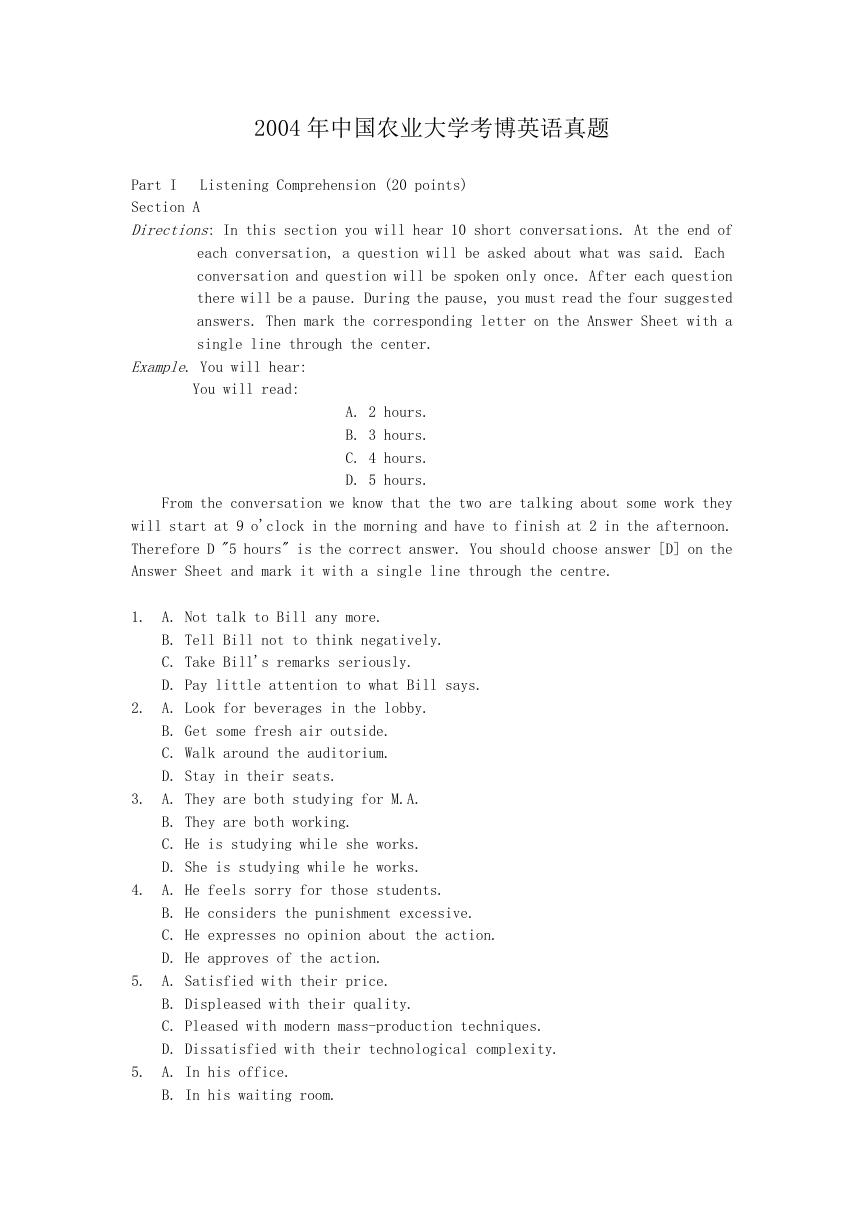
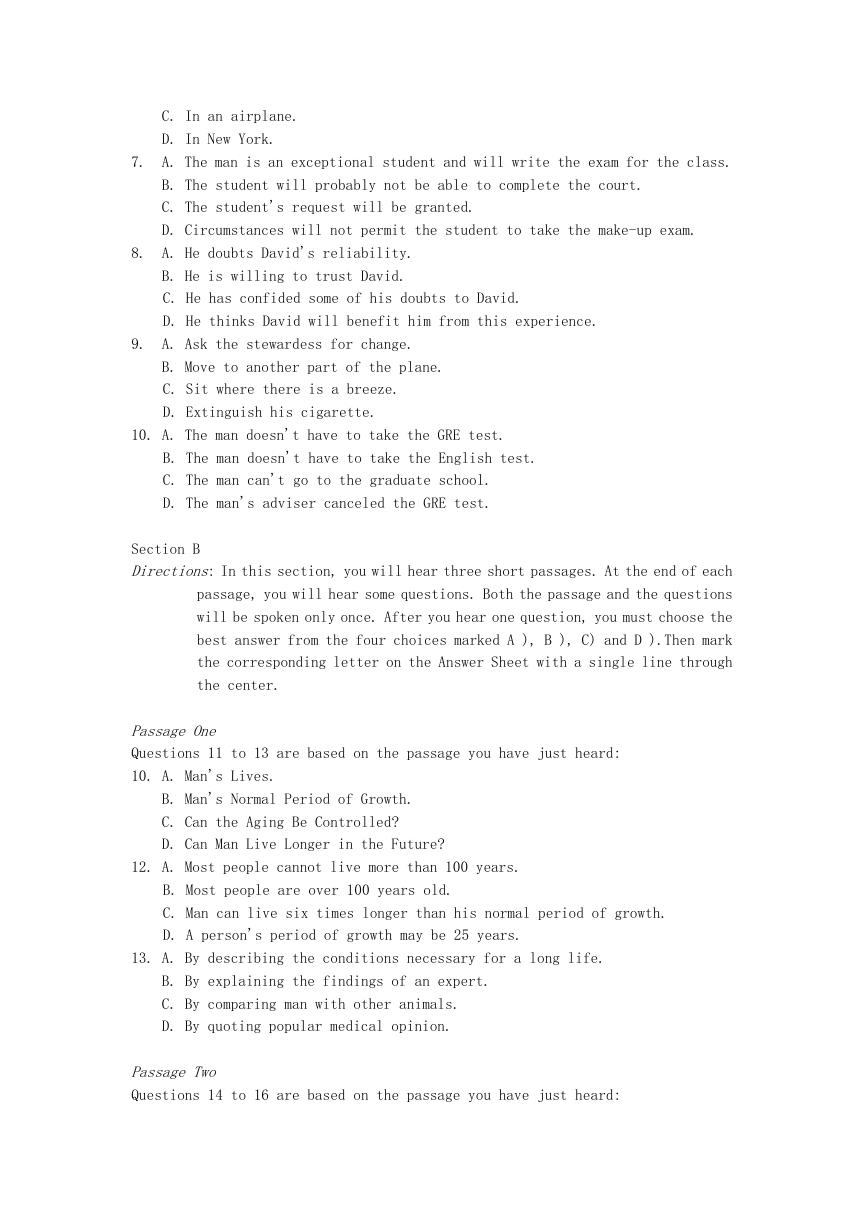
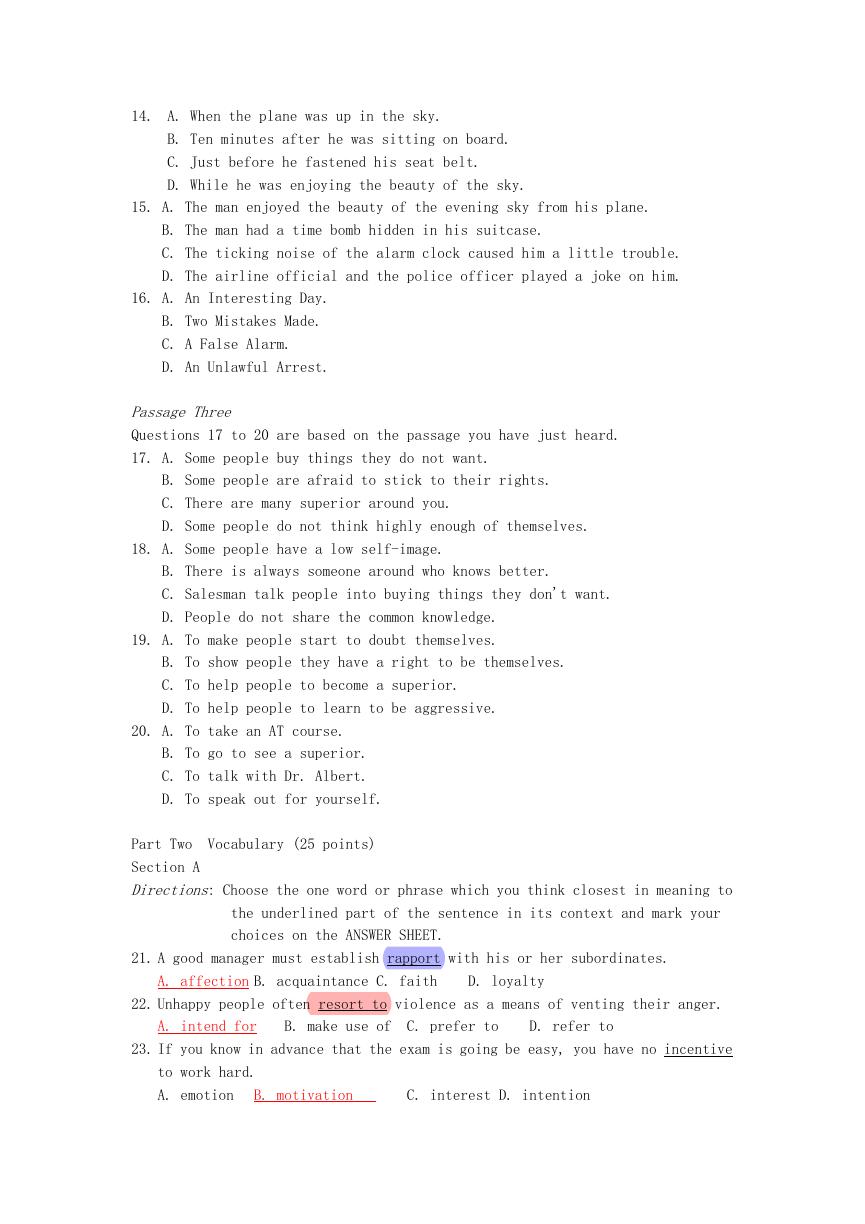
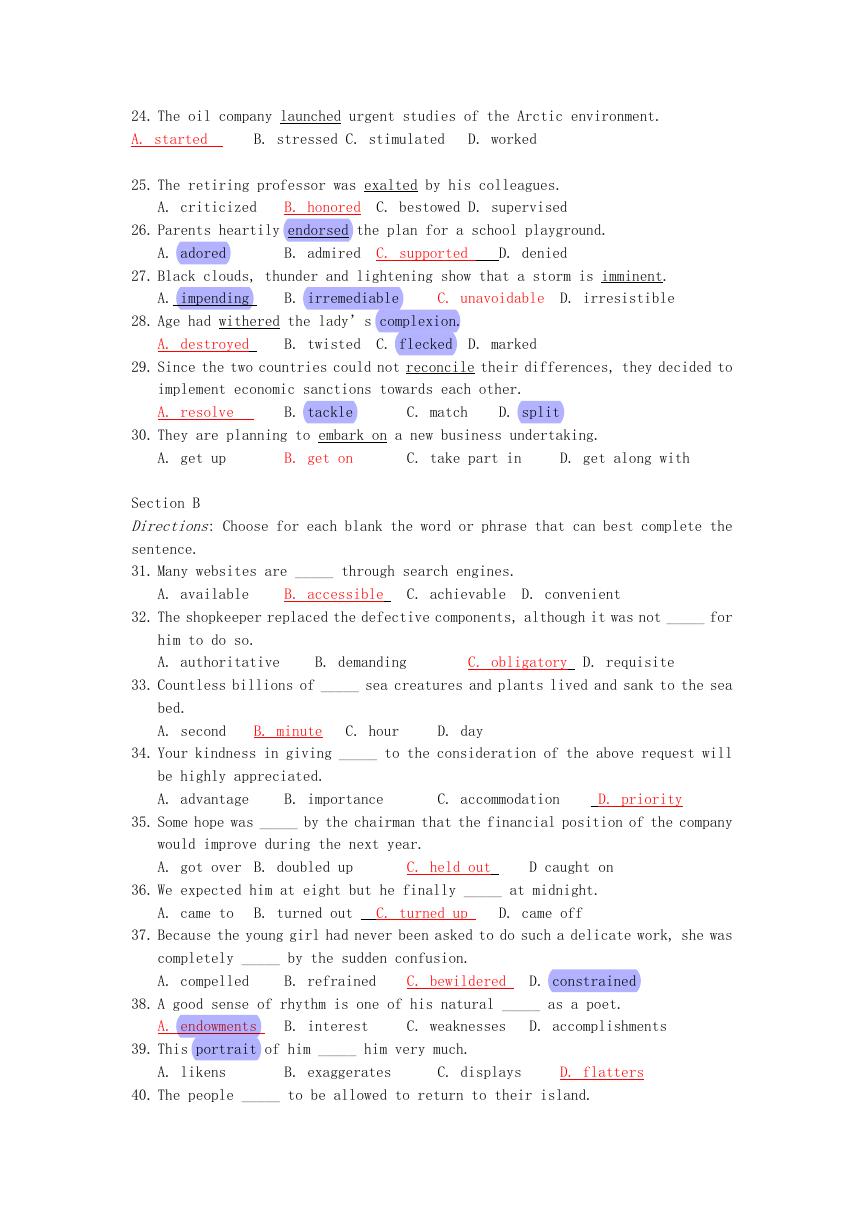
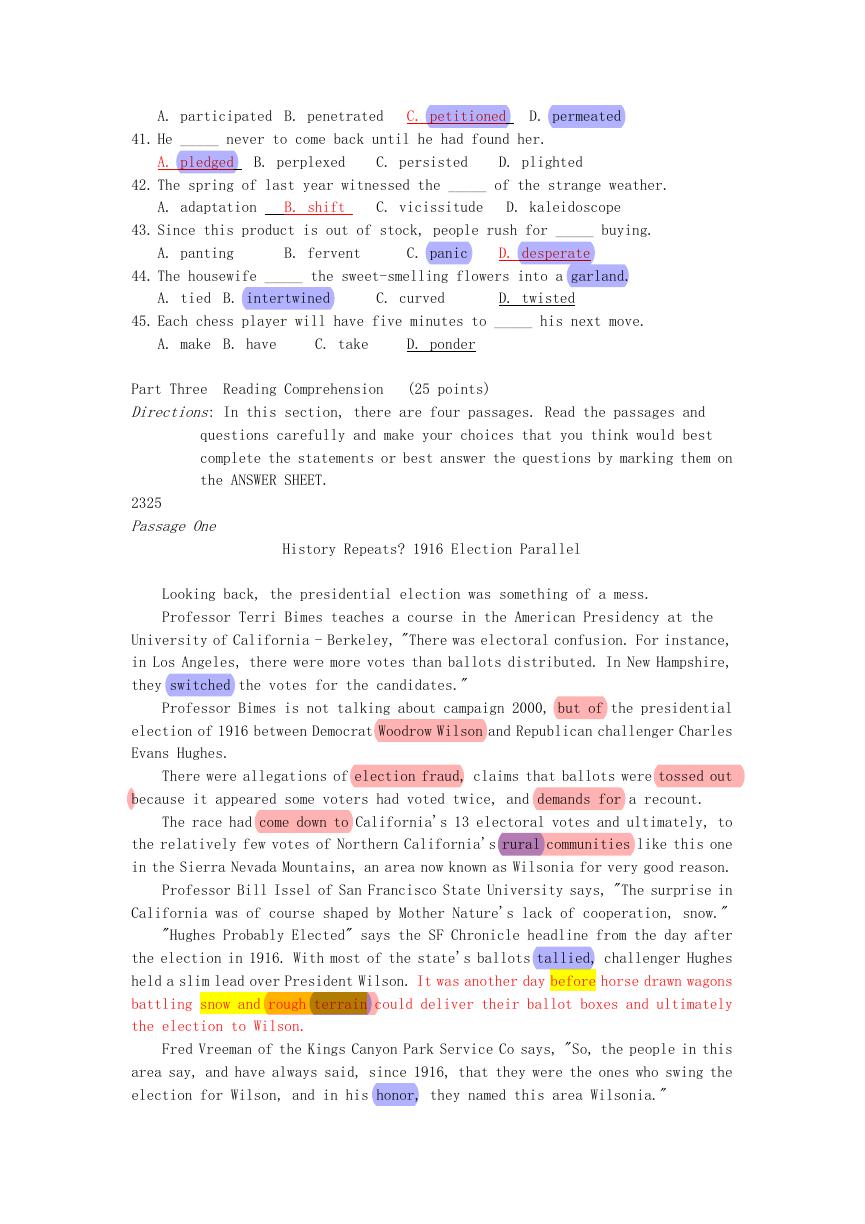
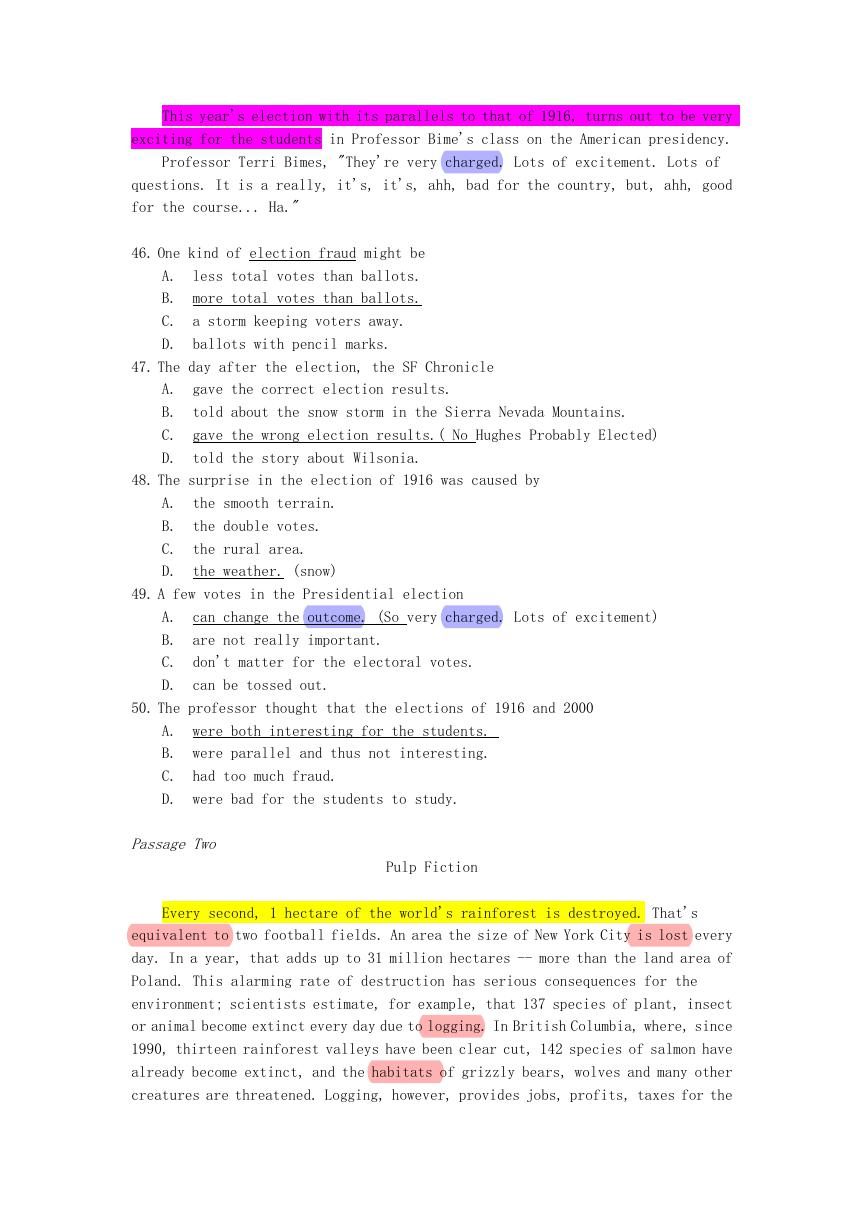
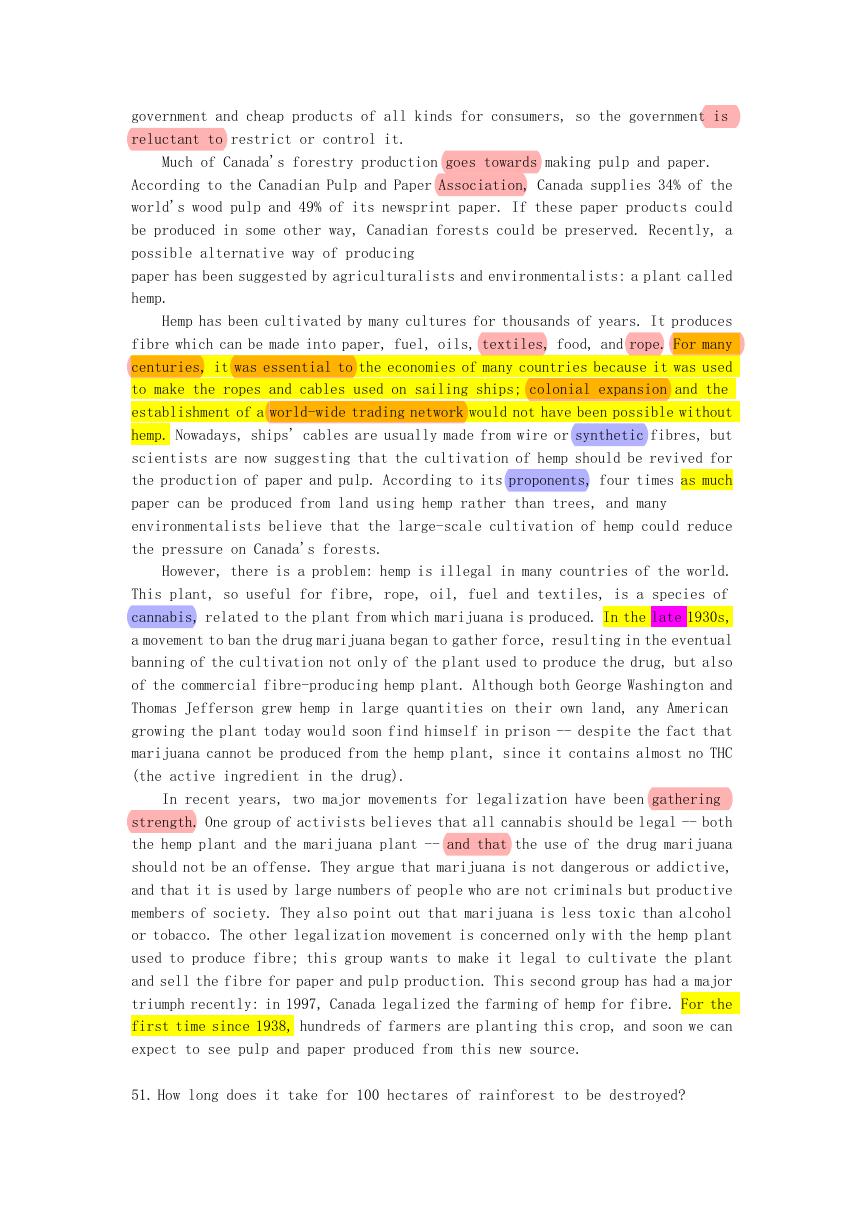









 2023年江西萍乡中考道德与法治真题及答案.doc
2023年江西萍乡中考道德与法治真题及答案.doc 2012年重庆南川中考生物真题及答案.doc
2012年重庆南川中考生物真题及答案.doc 2013年江西师范大学地理学综合及文艺理论基础考研真题.doc
2013年江西师范大学地理学综合及文艺理论基础考研真题.doc 2020年四川甘孜小升初语文真题及答案I卷.doc
2020年四川甘孜小升初语文真题及答案I卷.doc 2020年注册岩土工程师专业基础考试真题及答案.doc
2020年注册岩土工程师专业基础考试真题及答案.doc 2023-2024学年福建省厦门市九年级上学期数学月考试题及答案.doc
2023-2024学年福建省厦门市九年级上学期数学月考试题及答案.doc 2021-2022学年辽宁省沈阳市大东区九年级上学期语文期末试题及答案.doc
2021-2022学年辽宁省沈阳市大东区九年级上学期语文期末试题及答案.doc 2022-2023学年北京东城区初三第一学期物理期末试卷及答案.doc
2022-2023学年北京东城区初三第一学期物理期末试卷及答案.doc 2018上半年江西教师资格初中地理学科知识与教学能力真题及答案.doc
2018上半年江西教师资格初中地理学科知识与教学能力真题及答案.doc 2012年河北国家公务员申论考试真题及答案-省级.doc
2012年河北国家公务员申论考试真题及答案-省级.doc 2020-2021学年江苏省扬州市江都区邵樊片九年级上学期数学第一次质量检测试题及答案.doc
2020-2021学年江苏省扬州市江都区邵樊片九年级上学期数学第一次质量检测试题及答案.doc 2022下半年黑龙江教师资格证中学综合素质真题及答案.doc
2022下半年黑龙江教师资格证中学综合素质真题及答案.doc